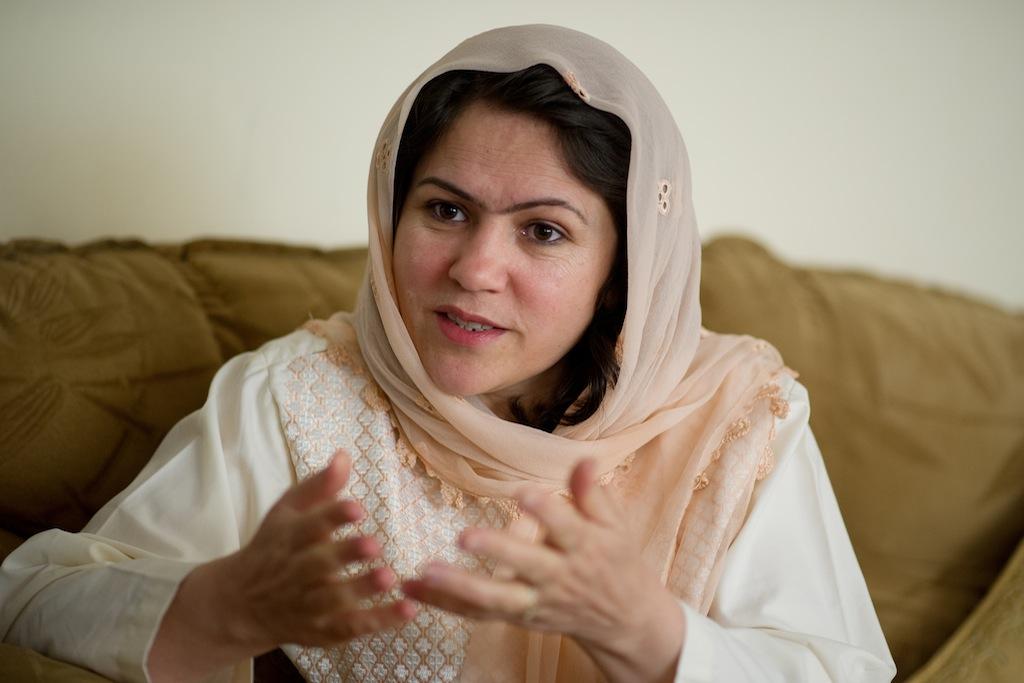Will this woman be Afghanistan’s next president?
Leading Afghan women’s rights champion, author, lawmaker and presidential hopeful Fawzia Koofi spoke with GlobalPost about what the future holds for women in her country.
NEW YORK — Last week at the Council on Foreign Relations, Afghanistan’s first female deputy speaker in parliament, Fawzia Koofi, painted a grim portrait of life on the ground in her native country.
“There is more violence from the Taliban, there is more suicide bombing, there is more killing,” she said. Additionally, she insists the Taliban must acknowledge women’s social, economic and political participation in order to ensure a sustained and durable peace.
Koofi, a determined, outspoken mother of two, admits that eleven years ago she would never have imagined defending the human rights of the Afghan people to an international forum. In Afghanistan, gender-based violence has long prevented women from participating in public life and barred their voices from decision-making and political forums. The fall of the Taliban in 2001 offered “a golden opportunity for women to begin again, and commit to change,” Koofi says.
Since that time, she has witnessed and contributed to tangible improvements in Afghanistan’s education, maternal mortality, employment, and the role of women in public life and governance. Koofi's own remarkable career path is a testament to the fight against female discrimination in her country’s history.
More from GlobalPost: Afghan women trapped in tribal court system
With relative calm, she recalls her rise to politics through a series of harrowing episodes: dodging bullets along the frontlines of a civil war on her walks to grade school; the murders of her father and brothers at the hands of the Taliban; her own victimization under the Taliban regime; the death of her detained husband in an Intelligence Service in Faizabad. Now, after a popular reelection to parliament, several assassination attempts, and copious death threats, she is ready to run for President in the 2014 elections.
When asked whether or not her country is prepared to receive a female leader she answers simply, “Why not.”
As Chairperson of the Women, Civil Society and Human Rights Commission, Koofi is working to give voices to unheard stories of strife across her country. She believes in the resiliency of Afghan women, and that they have brought strength to their own repressed cause. But despite recent advances, the “violence against women today is inconceivable.”
Recently, the Ministry of Women’s Affairs recorded 3,742 cases of violence against women from March 22 to December 31, Amnesty International reports. President Karzai’s Law on the Elimination of Violence against Women – the first piece of legislation in Afghanistan’s history to criminalize child marriage, forced marriage, forced self-immolation among other acts of violence – has been denounced as “un-Islamic” by religious leaders, and remains largely unenforced.
“It is becoming more clear, that what we worked for, and what were promised was not a reality. I am hopeful we will not have to rebuild from scratch – but I am confident that women and children have the most to lose from these political games.”
More from GlobalPost: Women's rights must be part of future plans in Afghanistan
Similar sentiments are echoed on the ground, by women and activists who fear that recent gains in human rights will not withstand the withdrawal of international forces in 2014.
"Violence against women has to be eliminated or at least reduced in Afghanistan," activist Humaira Rasouli told the Associated Press last Thursday, after joining dozens of marching activists in the streets of Kabul to denounce violence against women. “Unfortunately, … the violence against women rate is increasing day to day."
Koofi reports that cuts in funding and security have deflated classroom attendance in most rural areas. Schoolhouses and health clinics have been shutting on the retiring backs of international troops. Additionally troubling is the Afghan government’s unfair representation of women and ordinary Afghans in fast-track peace talks with its Taliban foes.
The Afghan High Peace Council that Mr. Karzai established for the negotiations consist of seventy members – nine of which are women who are marginalized in discussion, evidently recruited only for “the purpose of demonstrating that (women) are present for the negotiations,” Koofi contends.
She insists that the Council’s exclusivity bears negative implications for the future of women as well as for a durable, sustained peace in Afghanistan. “It is imperative that women be included in these peace talks,” Koofi insists. “This is a window of opportunity for Afghanistan to change its perception of women, and use a more inclusive approach to peace. Instead the Afghan people are being forgotten.”
Last week, Koofi listened as President Barak Obama assured his nation “with confidence” that by the end of next year, “our war with Afghanistan will be over.” She agrees that the American troops cannot remain indefinitely, but is skeptical of the US government’s vow to safeguard women’s rights post-2014 before “walking away.”
“The American mission may be over, but my country’s war remains. Bombs will continue to explode, women and children continue their struggle. I worry for the future of democracy," she said.
As Taliban and warlords begin filling the gaps of departing international forces, Koofi is trying to appeal to an international audience before it is too late. She posed her case to the Council on Foreign Relation last week, declaring “you [the US] also sacrificed blood and treasure for those values with us. You also spent a lot of money and blood in Afghanistan to help us get to that level—are you ready to reverse, are you ready to go back and start from scratch?”
For more of GlobalPost's reporting on the women of Afghanistan, check out our Special Report "Life Sentence: Women and Justice in Afghanistan."
We want to hear your feedback so we can keep improving our website, theworld.org. Please fill out this quick survey and let us know your thoughts (your answers will be anonymous). Thanks for your time!
